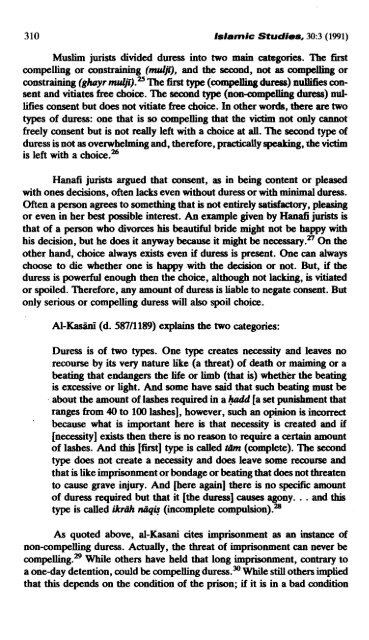LAW OF DURESS IN ISLAMIC LAW AND COMMON LAW: A ...
LAW OF DURESS IN ISLAMIC LAW AND COMMON LAW: A ...
LAW OF DURESS IN ISLAMIC LAW AND COMMON LAW: A ...
Create successful ePaper yourself
Turn your PDF publications into a flip-book with our unique Google optimized e-Paper software.
310 Islamic Studies, 30:3 (1991)<br />
Muslim jurists divided duress into two main categories. The first<br />
compelling or constraining (mulji), and the second, not as compelling or<br />
constraining (ghyr mulji) . 25 The first type (compelling duress) nullifies con-<br />
sent and vitiates free choice. The second type (non-oompelling duress) nul-<br />
lifies consent but does not vitiate free choice. In other words, there are two<br />
types of duress: one that is so compelling that the victim not only cannot<br />
freely consent but is not really left with a choice at all. The second type of<br />
duress is not as overwhelming and, therefore, practically speaking, the victim<br />
is left with a choice.26<br />
Hanafi jurists argued that consent, as in being content or pleased<br />
with ones decisions, often lacks even without duress or with minimal duress.<br />
Often a person agrees to something that is not entirely satisfactory, pleasing<br />
or even in her best possible interest. An example given by Hanafi jurists is<br />
that of a person who divorces his beautiful bride might not be happy with<br />
his decision, but he does it anyway because it might be neces~ary.~ On the<br />
other hand, choice always exists even if duress is present. One can always<br />
choose to die whether one is happy with the decision or not. But, if the<br />
duress is powerful enough then the choice, although not lacking, is vitiated<br />
or spoiled. Therefore, any amount of duress is liable to negate consent. But<br />
only serious or compelling duress will also spoil choice.<br />
Al-Kasiini (d. 587/1189) explains the two categories:<br />
Duress is of two types. One type creates necessity and leaves no<br />
recourse by its very nature like (a threat) of death or maiming or ti<br />
beating that endangers the life or limb (that is) wheth;er the beating<br />
is excessive or light. And some have said that such beating must be<br />
about the amount of lashes required in a &add [a set punishment that<br />
ranges from 40 to 100 lashes], however, such an opinion is incorrect<br />
because what is important here is that necessity is created and if<br />
[necessity] exists then there is no reason to require a certain amount<br />
of lashes. And this [ht] type is called fdm (complete). The second<br />
type does not create a necessity and does leave some recourse and<br />
that is like imprisonment or bondage or beating that does not threaten<br />
to cause grave injury. And bere again] there is no specific amount<br />
of duress required but that it [the duress] causes agony. . . and this<br />
type is called ikrcsh -4 (incomplete comp~lsion).~~<br />
As quoted above, al-Kasani cites imprisonment as an instance of<br />
non-compelling duress. Actually, the threat of imprisonment can never be<br />
compelling.29 While others have held that long imprisonment, contrary to<br />
a one-day detention, could be compelling duress." While still others implied<br />
that this depends on the condition of the prison; if it is in a bad condition
















